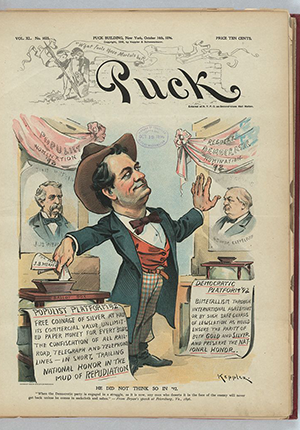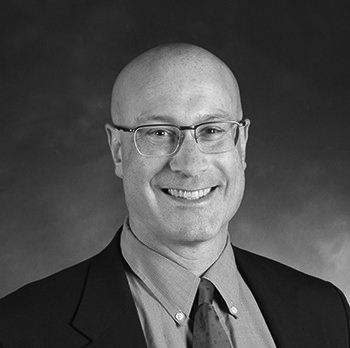Historic Document
Populist Party Platform (1892)
Populist Party | 1892

Library of Congress, Prints and Photographs Division
Summary
The Populist movement and People’s Party took shape in the late 1880s and early 1890s. This enormously influential third-party effort arose from the grievances of farmers’ and workers’ organizations, as new nation-spanning corporations arrogated to themselves the tools of transportation, industry, and finance, while neither Democratic nor Republican lawmakers seemed willing to take up labor and agrarian movements’ demands for reform. With the two old parties and the Supreme Court all beholden to corporate wealth, Populists contended that the Constitution itself was imperiled. Populists held that the Constitution’s “doctrine of equality” was “not limited to a dogma that all men should be made equal before the law.” The “real theory,” according to Populist spokesman James F. Hudson, was this: “[I]n our Constitution the principle is imbedded” of securing “the widest distribution among the people, not only of political power, but of the advantages of wealth, education, and social influence.” The People’s Party wove these constitutional ideas into its platform, which asserted that “the political rights and personal liberties of the citizen” depended on government ending the “tyranny and political power” of big corporations.
Selected by

William E. Forbath
Lloyd M. Bentsen Chair in Law, and Associate Dean for Research, The University of Texas at Austin School of Law

Ken I. Kersch
Professor of Political Science, at Boston College
Document Excerpt
The conditions which surround us best justify our co-operation; we meet in the midst of a nation brought to the verge of moral, political, and material ruin. Corruption dominates the ballot-box, the Legislatures, the Congress, and touches even the ermine of the bench. . . . The newspapers are largely subsidized or muzzled, public opinion silenced, business prostrated, homes covered with mortgages, labor impoverished, and the land concentrating in the hands of capitalists. The urban workmen are denied the right to organize for self-protection; imported pauperized labor beats down their wages, a hireling standing army, unrecognized by our laws, is established to shoot them down . . . . The fruits of the toil of millions are boldly stolen to build up colossal fortunes for a few, unprecedented in the history of mankind; and the possessors of these, in turn despise the Republic and endanger liberty. From the same prolific womb of governmental injustice we breed the two great classes—tramps and millionaires. . . .
Assembled on the anniversary of the birthday of the nation . . . we seek to restore the government of the Republic to the hands of “the plain people,” with which class it originated. We assert our purposes to be identical with the purposes of the National Constitution, to form a more perfect union and establish justice, insure domestic tranquillity, provide for the common defense, promote the general welfare, and secure the blessings of liberty for ourselves and our posterity. . . .
We declare, therefore,
First—That the union of the labor forces of the United States this day consummated shall be permanent and perpetual; may its spirit enter into all hearts for the salvation of the Republic and the uplifting of mankind.
Second— . . . . The interests of rural and civic labor are the same; their enemies are identical.
Third—We believe that the time has come when the railroad corporations will either own the people or the people must own the railroads, and should the government enter upon the work of owning and managing all railroads, we should favor an amendment to the Constitution by which all persons engaged in the government service shall be placed under a civil service regulation of the most rigid character, so as to prevent the increase of the power of the national administration by the use of such additional government employees. . . .
Land—The land, including all the natural sources of wealth, is the heritage of the people, and should not be monopolized for speculative purposes, and alien ownership of land should be prohibited. All land now held by railroads and other corporations in excess of their actual needs, and all lands now owned by aliens, should be reclaimed by the government and held for actual settlers only.




